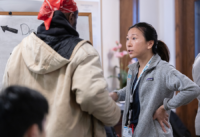Health care systems navigate supply chain disruptions
Virginia health systems adjusted practices and sourcing as IV fluid shortages, tariffs and global disruptions strained supply chains.
Centra’s $600M+ capital upgrades include new hospital tower
What’s expected to be a three-year, $400 million construction project is underway at Centra Lynchburg General Hospital (LGH). A new six-story tower will add 266,200 square feet to the hospital and marks the biggest portion of more than $600 million in recent capital investments by Centra Health, a regional nonprofit health system serving more than […]
Can Virginia’s medical schools fill physician shortages?
Virginia faces a growing physician shortage as retirements rise, residency slots lag and medical school capacity strains, despite record application numbers.
Health systems forecast pain from Medicaid cuts
Virginia hospitals face closures as Medicaid cuts hit budgets; Augusta Health closes clinics, warns of $40M loss by 2034.
Health Care 2025: JACKSON, REESE
Since 2016, Jackson has led Chesapeake Regional Healthcare, which includes the Chesapeake Regional Medical Center and more than 40 practice locations, as well as about 600 physicians serving Hampton Roads. In early April, the hospital opened a psychiatric emergency room, the first on Hampton Roads’ south side, and at the end of the month, the […]
Health Care 2025: JEVSEVAR, DR. DAVID S.
In 2022, Jevsevar became CEO of OrthoVirginia, the largest independent orthopedic practice in the state, with 155-plus orthopedic specialist physicians across more than 35 locations in Lynchburg, Northern Virginia, Richmond, Southwest Virginia and Hampton Roads. The practice, which is the official orthopedic and sports medicine provider of the Washington Commanders, turns 10 this year. An [&hellip[...]
Health Care 2025: PESICKA, EDWARD A.
Pesicka became CEO of Fortune 500 health care logistics and supply company Owens & Minor in 2019. In 2023, he announced a five-year strategic plan for the company to increase profits and reduce costs. Owens & Minor reported $10.7 billion in fiscal 2024 revenue, up from $10.3 billion in 2023. The company has been engaged […]
Health Care 2025: LEVY, DR. MARLON
After two years serving as VCU Health‘s interim leader, Levy was appointed permanently in November 2024. A specialist in abdominal organ transplant surgery, Levy was named to lead the Richmond medical system and its health sciences department following the sudden departure of Dr. Art Kellermann in late 2022. Early in 2023, news broke that VCU […]
Health Care 2025: DAVIS, MELINA
In 2014, Davis became executive vice president of MSV, a trade organization that represents more than 30,000 physicians, physician assistants, residents and medical students. Four years later, she took the helm as CEO. MSV successfully advocated for laws to allow Virginia health care professionals to seek mental health care and help for career fatigue without […]
Health Care 2025: LUTES, MICHAEL
Lutes joined Bon Secours in 2022 as Richmond market president. The health system created his state president role this year; he now oversees the Richmond and Hampton Roads markets, including about 14,000 employees across the state. In May, the health system opened its approximately $80 million, 100,000-square-foot Harbour View Medical Center in Suffolk. The same […]
Health Care 2025: DAVIS-HAGENS, PAT
Davis-Hagens has had a busy 2025 as Bon Secours expands its Hampton Roads facilities. The health system opened its Harbour View Medical Center, an approximately $80 million, 100,000-square-foot hospital in Suffolk, in May. That month, Bon Secours also opened a primary care clinic in Portsmouth, and in June, its women’s imaging center in Portsmouth opened. […]
Health Care 2025: ARNER, STEVE
Arner succeeded Nancy Howell Agee as CEO in October 2024, after being promoted to president in 2023. He leads Carilion’s 13,000-plus workers, who serve about 1 million patients in Virginia and West Virginia at seven hospitals and 250 medical offices. Arner, who joined Carilion in 1996 as a financial analyst, previously served as chief operating […]























